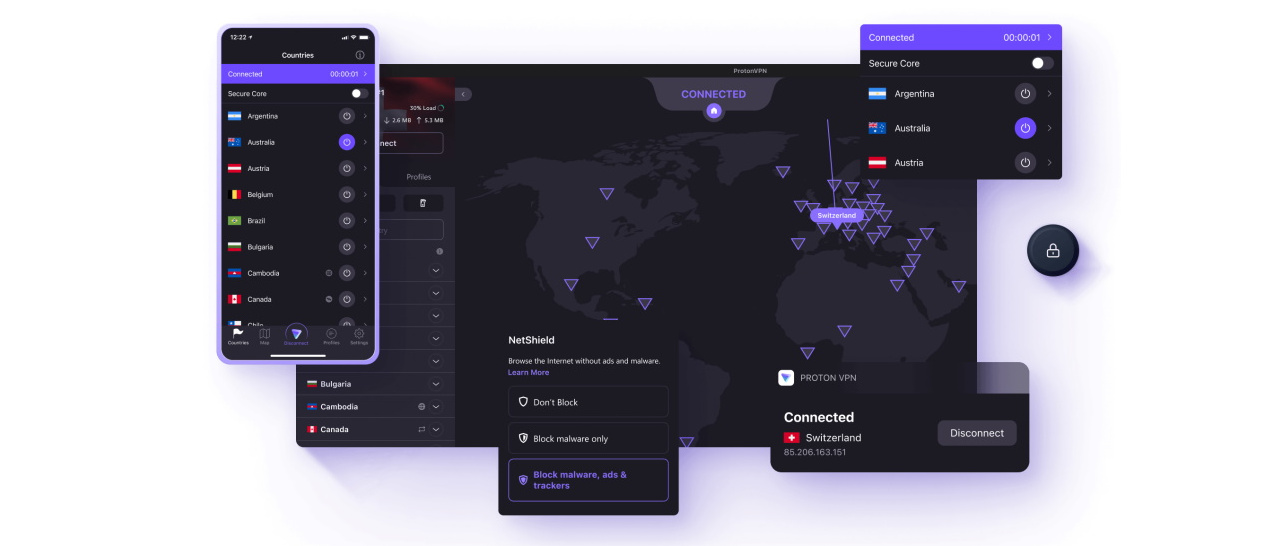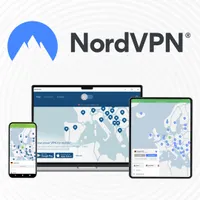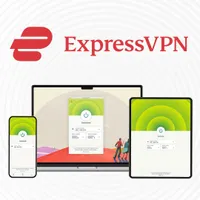TechRadar Verdict
Proton VPN Free offers a premium-feeling free VPN experience. Solid speeds and a sleek app interface offer reassurance despite limitations such as just 10 locations, which you can't choose from, and its single device connection. Plus, despite unlimited bandwidth, throttling issues leave much to be desired for P2P or streaming-focused users.
Pros
- +
Unlimited data
- +
Excellent speeds
- +
Reliable kill switch
Cons
- -
1 locations only
- -
Just supports a single connection
Why you can trust TechRadar
Proton VPN Free is undoubtedly among the best free VPNs available. Offering a broad spectrum of compatibility across devices, impressive speeds, and unlimited bandwidth, it would be easy for anyone looking for a free VPN to get started using Proton VPN Free.
That said, its apps aren't the simplest, you're limited to only one connected device at a time, and you can't choose which of its 10 available locations you connect to. Plus, our testing found some concerning throttling indicators which could make Proton VPN Free one to avoid should you be looking for a free streaming VPN or torrenting VPN.
Proton VPN Free is still one of the best free VPNs out there. We've updated this page with the latest information about the provider's most recent improvements, including the new server locations and in-house VPN architecture.
Features
Proton VPN Free does exactly what a VPN needs to do and little else. Included in the free plan is your VPN connection, a kill switch, all of Proton VPN's protocols, and the ability to customise your app icon, in case you find yourself in a region with VPN restrictions.
Following recent updates, the app now offers 10 free servers and the company are developing a new, in-house VPN architecture that could lead to significant improvements in the future.
In our testing, we found no reason to be concerned about the kill switch. It was easy enough to set up, though it does require the VPN to be set as an 'always-on VPN' on Android devices.
Upgrading to a paid Proton VPN plan unlocks a plethora of further capabilities for the VPN.
For starters, NetShield, Proton VPN's ad, tracker, and malware blocking software. You can also access Proton VPN's Secure Core server network, which is its equivalent of multi-hop, use Proton for P2P downloading and file sharing, gain one-click access to Tor, split-tunnel your VPN traffic, and unlock Proton VPN's full suite of customization options.
These customisation options range from custom DNS to LAN connections, and even specific NAT types, plus you can set up specific profiles with tailored settings. Something to note is that while Proton VPN Free does allow you to create these fully customized profiles, you can only use them once you upgrade to a paid plan.
Features score: 4/10
Server Network
Proton VPN Free highlights one of the often overlooked benefits of paid VPNs, the ability to choose the server location you need, rather than simply being provided with one.
Proton VPN Free offers 10 server locations: the Netherlands, Romania, Singapore, Mexico, Japan, Norway, Switzerland, United States, Poland and Canada.
However, you do not get to choose which of these servers you connect to; instead, you are auto-connected to the fastest server available to you, which, more often than not, is the closest.
While not a big concern, should you plan to use Proton VPN Free just to secure your online traffic, it does limit Proton VPN Free's capabilities as a streaming VPN. Plus, you're likely guaranteed to have speed limitations if you're not close to any of the servers.
Choosing Proton VPN's paid version drastically increases the offering. Upping the countries available to a whopping 126, and, more importantly, you gain the ability to choose the exact location you want to connect to.
Server network score: 5/10
Apps
Despite being free, Proton VPN Free offers a good selection of apps. Free plan users can access Proton VPN on Windows, macOS, Android, iOS, Linux, Chrome, Firefox, and Chromebook.
The biggest omissions from this list that you'd be able to access should you choose Proton VPN's paid plan are its smart TV apps. This includes compatibility on Apple TV, Android TV, and Fire TV Stick.
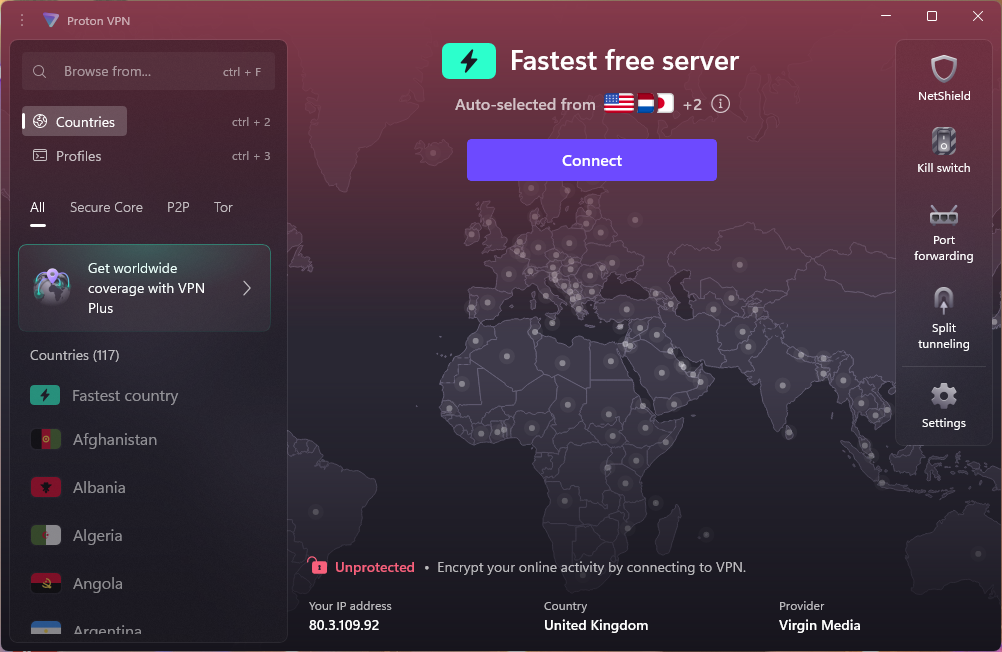
Generally, however, the spread of compatibility available is impressive. What's more, each of Proton VPN Free's apps closely resembles each other, and features that might be hidden on smaller screen devices, such as mobiles, are easily accessible should you be looking to use Proton VPN free on your tablet or computer.
Apps score: 8/10
Ease of use
Proton VPN across both its paid and free plans is not the simplest VPN to look at, though this doesn't make it trouble to use, even if beginners might need a touch more time.
What must be said, though, is that while Proton VPN Free isn't the simplest to look at, it is arguably the best free VPN to look at for sheer aesthetics. Its dark purple theme, partnered with a simple enough map interface, makes for extremely pleasant viewing, even if all you can do with the free plan is click the connect button before you set about your browsing elsewhere.
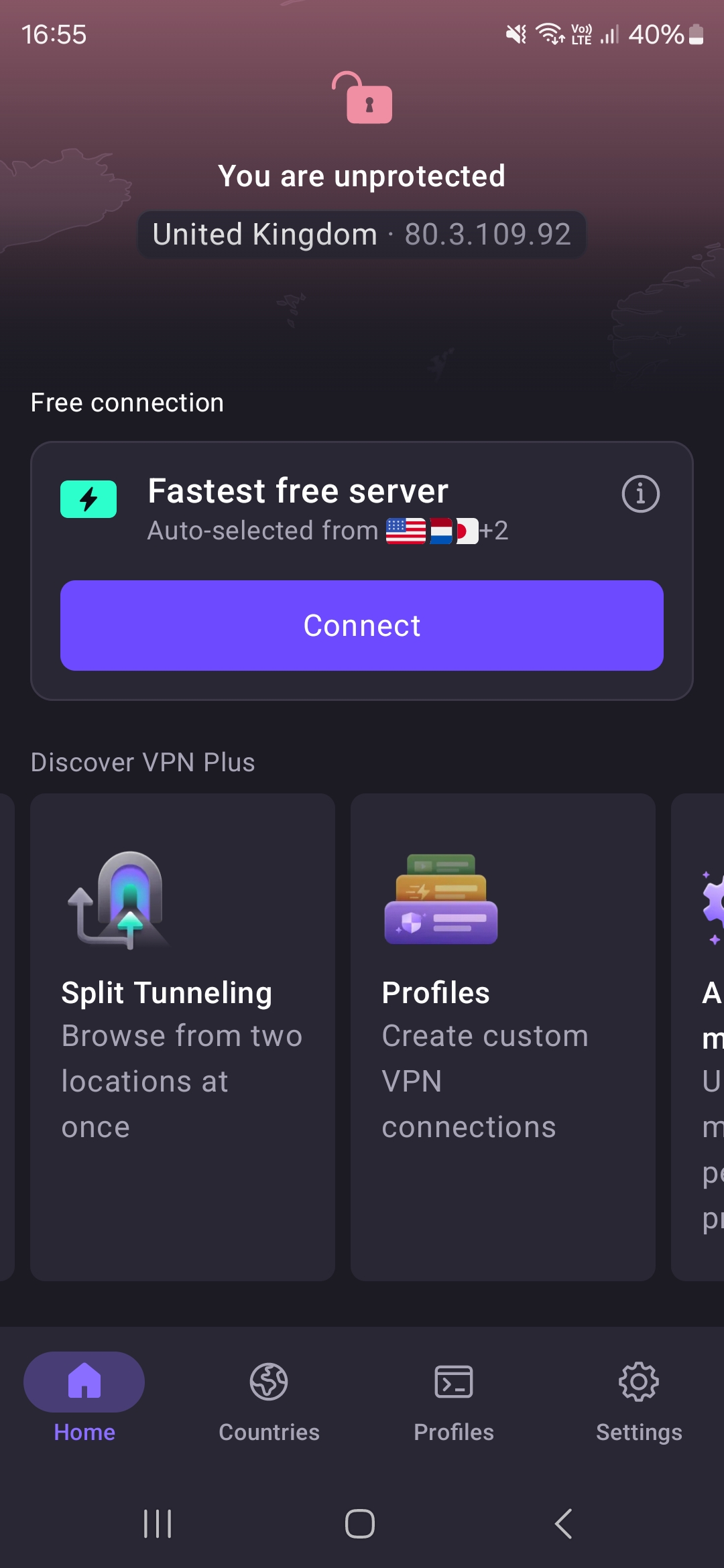
Proton VPN Free on Android is now a sleek VPN to look at, even if not as simple as the likes of ExpressVPN, thanks to a recent UI revamp.
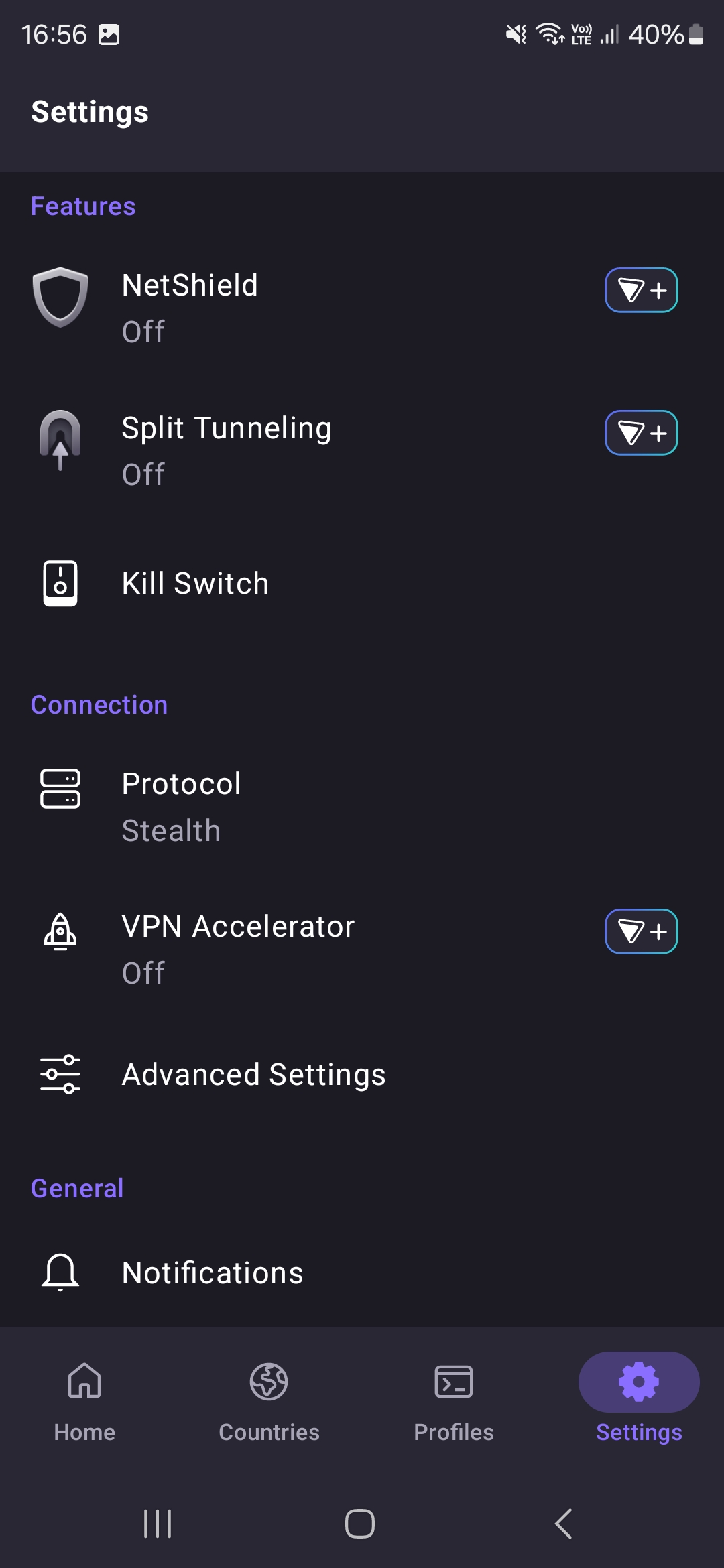
Using Proton VPN Free limits some features, anything you cannot access is indicated by either being greyed out, or by having the Proton logo with a plus symbol next to it.
Setting up Proton VPN Free is appreciably simple. Most notably, you're not instantly pushed to make a paid plan account from the outset, unlike many free VPNs. Instead, should you need to sign up, you simply create your account by clicking the button on the login menu, and after going through the steps and signing in, you're greeted with the usual home screen, and a bar telling you what you're missing out on by not having the paid plan. No hidden free plan signup, no trial you need to navigate, just quick access to the free service, and easy ways to upgrade should you choose to.
Once in, there are only two buttons you need to worry about: connect, which you're greeted with on the main screen, and your kill switch. As mentioned already, given the lack of server choice, the connect button does everything for you once clicked, connecting you to the fastest server in a matter of seconds. Your kill switch can be found quickly via the settings tab on mobile phones and tablets, or via the kill switch icon on computers.
Ease of use score: 8/10
Speed and performance
Proton VPN Free is, without doubt, one of the quickest free VPNs available. However, our latest testing revealed a couple of unfortunate issues you may wish to consider before jumping to your own conclusions.
Firstly, in terms of speeds, Proton VPN free achieved a maximum of 335 Mbps, which is by no means slow. These kinds of speeds would comfortably allow you to stream, game, or browse without any major issues. Our concern with this comes from the fact that our previous round of testing saw the free service achieve around 900 Mbps, which is a concerning drop-off.
What's more, testing on an Android device saw our speeds when connected to the VPN halve when compared to what we saw without a VPN connection using either WiFi or a mobile data connection. While this still saw us achieve speeds well over 100 Mbps, it's a notable amount of speed to lose, depending on the tasks you're aiming to achieve.
A final concern we found was that there was evidence of substantial throttling of speeds after a certain amount of data was used. In testing, after using 3-4GB of data, we saw our speeds drop to only around 5 Mbps, which, while fine for browsing or emails, would leave you struggling should you wish to stream or download on your VPN connection.
Given the lack of server choice, it's unlikely you'd choose Proton VPN Free for streaming anyway, but this should definitely come into consideration. Should you be looking for a fast and simple solution to day-to-day internet needs, Proton VPN Free is a seriously strong option.
Speed and performance score: 7/10
Unblocking
Testing Proton VPN's ability to unblock content isn't a simple feat because, as we've mentioned, you don't get to choose the location you connect to.
This means seeing the full scope of Proton VPN Free's capabilities isn't possible from one testing location, like we have. What we can say is we were flawlessly able to access Dutch streaming services, including Disney+, Netflix, and Prime Video.
Although we cannot guarantee the same levels of success in other regions, our testing of Proton VPN's paid plan suggests you should have equal levels of success. This is because the paid plan was able to comfortably unblock all the streaming services we tested in all 126 regions, including Netflix, Prime Video, Disney+, BBC iPlayer, 10Play, 9Now, and more.
Unblocking score: 5/10
Privacy and security
Despite not being able to access Proton's full suite of security features with Proton VPN Free, you have no reason to feel as though your data is at any risk, thanks to how the service has been set up.
First and foremost, Proton VPN is constantly proving that it not only doesn't store your data, but also that it has no vulnerabilities that may put your online privacy at risk. An independent audit by Securitum in July 2024 marked the third consecutive year of Proton annually proving its claims, and, while at the time of writing, we're yet to see an audit in 2025, we expect this to continue.
When using Proton VPN Free, you can use any of its various secure VPN protocols, including OpenVPN, WireGuard, and its proprietary Stealth protocol. Both WireGuard and OpenVPN have long been common in the VPN industry, and both have been proven countless times to be secure and reliable protocols. WireGuard uses its traditional ChaCha20 encryption with Proton VPN, while Proton VPN's OpenVPN deployment uses AES-256, another impressively secure encryption method. In January 2026, Proton announced it was removing support for OpenVPN configuration files that were downloaded before September 2023. Users of the official app are unaffected. However, people running manual setups on routers, Linux terminals, or third-party clients must refresh their credentials.
Stealth, Proton VPN's proprietary protocol, is an obfuscated version of WireGuard that runs over TLS. This makes your browsing data look like normal encrypted browsing data to anyone who might analyze your traffic to spot VPN usage. For most, this is a bonus that won't be entirely necessary, but should you be tackling enterprise rule-based firewalls or DPI-based firewalls, this protocol may prove to have better luck.
Key things missing from Proton VPN Free include Proton VPN's equivalent of multihop, called Secure Core, as well as its NetShield ad, malware, and tracking blocker, and any kind of split tunneling. While missing out on split-tunelling and multihop is unfortunate, we'd usually recommend running an external ad and malware blocker alongside a VPN anyway, so NetShield doesn't prove as big a loss.
Privacy and security score: 8/10
Track record
Given Proton's wide suite of security tools and privacy-first claims, it attracts a great deal of attention and scrutiny online. Luckily, for the most part, it has proven to be flawless. An instance in 2019 where Proton Mail was forced to log a climate activist's IP after a law enforcement request proves to be the only mark on an otherwise problem-free record across its product range.
Swiss law works differently for VPN providers. VPN providers cannot be compelled to carry out bulk surveillance by either Swiss or foreign law enforcement. This makes Proton VPN much less vulnerable to requests that might put privacy at risk. At an individual account level, Proton VPN does need to comply with legally valid cases brought by the Swiss court, even if made by foreign entities. However, Switzerland has no ties to the EU, US, or NATO intelligence sharing pacts, and often doesn't recognize requests from countries with a poor judicial reputation.
Switzerland's privacy laws have been under review during the past 12 months, raising concerns that privacy protections may be undermined should certain provisions come into force. However, companies – including Proton – have pushed back on the proposals and, at the time of writing, no significant changes have been introduced.
Track record score: 9/10
Customer Support
Proton VPN's customer support options are more limited than most, especially on its free plan.
Should you encounter any issues while using the free plan, you can either use its support site to browse articles that may help you fix your issue, or you can use a contact email address to get some form of support from a human, depending on your issue.
In practice, Proton VPN's support articles are impressively helpful, and there's more than enough of them to cover most issues you face, and while it can be slow to contact a human via email, it's at least a viable alternative should you run into any issues not covered.
The biggest omission for Proton VPN Free customers is no live support functionalities. Even paid Proton VPN customers aren't quite able to access 24/7 support, but the lack of any kind of live chat does mean beginners could be left in the cold if struggling to find the support they need early on in their time using a VPN.
Customer support score: 7/10
Pricing and plans
Proton VPN Free does lack a fair amount compared to what a paid Proton VPN plan can offer, but that doesn't mean it isn't a supremely capable free VPN, depending on your needs.
By choosing to upgrade to Proton VPN's paid option, you can access:
- 15,000+ servers across 126 countries – plus the ability to choose which server you connect to!
- Servers capable of speeds up to 10 Gbps with VPN Accelerator
- Netshield ad, malware, and tracker blocking
- Secure Core (multihop) connections
- P2P downloading and file sharing
- 10 simultaneous connections
- The Tor network within your regular browser
- Split tunneling
- VPN Profiles
- Advanced VPN customisation settings
Given Proton VPN starts from $3.59 per month, that is a lot to include in that cost. While it's not as cheap as Surfshark or NordVPN, its paid plan also proved to be capable of speeds which matched the very fastest VPNs throughout, and it also proved flawless at unblocking streaming services.
So, while Proton VPN Free is a great free VPN choice to secure your day-to-day online activities, upgrading to a paid plan could prove to be extremely beneficial depending on what you want to achieve with your VPN.
Pricing and plans score: 9/10
Should you use Proton VPN Free?
If you are looking for a free VPN to protect you while you’re out and about, working overseas, or on holiday, and you’re worried about privacy when you’re connected to public Wi-Fi or someone else’s network, Proton VPN Free is without doubt a good choice for you.
While it doesn’t have much in the way of extra features, you can install it on your device, connect to the VPN, and then pretty much forget all about it. With speeds that will comfortably handle most tasks, an easy-enough interface, and a simple setup process, it's a breeze to get connected in a matter of minutes without being pressed into upgrading to its paid option.
Overall score: 70/100
Alternatives
NordVPN – from $3.39 per month
The best VPN overall
NordVPN ranks as our best VPN overall, making it a superb alternative to any VPN, especially a free one such as Proton VPN Free. Comparing NordVPN to Proton VPN's paid plan, you get more countries, even if only one, equally impressive speeds, clocking in over 950 Mbps, and a whole host of features, including Threat Protection Pro and Meshnet, all for a price cheaper than Proton VPN.
Surfshark – from $2.19 per month
The best cheap VPN (and also the fastest)
Surfshark is not only the best cheap VPN out there, at only $1.99 per month for two years, but it's also the fastest VPN we tested. Add to that impressive features such as Alternative ID, Surfshark Search, and Antivirus, and you can find yourself a complete security package for a matter of dollars with little difficulty.
ExpressVPN - from $3.99 per month
A beginner-friendly VPN package
ExpressVPN is without doubt one of the most secure VPN providers. It’s a more expensive VPN than almost any other VPN provider, but in return, you access a high-speed server network that spans 148 locations in 105 countries. Plus, it offers one of the easiest interfaces we've tested, across almost any device you can think of, even if you only get 8 simultaneous connections to use at once.
We test and review VPN services in the context of legal recreational uses. For example: 1. Accessing a service from another country (subject to the terms and conditions of that service). 2. Protecting your online security and strengthening your online privacy when abroad. We do not support or condone the illegal or malicious use of VPN services. Consuming pirated content that is paid-for is neither endorsed nor approved by Future Publishing.

Rob is TechRadar's VPN Editor. Coming from a background in phones and technology, he's no stranger to the risks that come with putting yourself online. Over years of using different platforms, testing the limits of his online persona, and feeling the brunt of several data breaches, Rob has gained a keen understanding of cybersecurity and the benefits of services such as VPNs in providing a secure online experience. He uses this to not only advise on the best ways to stay secure online but also share his own experiences and especially how to avoid trouble. Outside of work, you'll find Rob on the tennis courts, in the gym, or diving into the biggest and best games of the year.
To share a story or tip, email robert.dunne@futurenet.com
You must confirm your public display name before commenting
Please logout and then login again, you will then be prompted to enter your display name.
